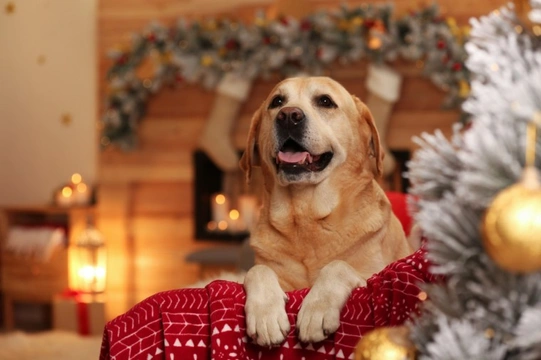
Five weird Christmas dangers to dogs you might not have thought of
Christmastime is for many of us one of our favourite times of the year, and if your dog is one of the family you might well have spent just as much thought and care planning how to get them involved in the celebrations and what to buy them for a gift as you have the rest of your family!
It is absolutely fine to involve your dog in your Christmas celebrations as much or as little as you want to, and as far as your dog enjoys it all; as long as you monitor and keep an eye on them to ensure they’re not finding it all rather stressful, or getting overstimulated and starting to act out.
Keeping dogs safe at Christmas is of course an integral part of ensuring that you all enjoy the season and get through it unscathed without a surprise trip to the out-of-hours veterinary clinic; and most dog owners are aware of all of the major and most common Christmas hazards to dogs, like Christmas pudding and of course, chocolate!
However, some dogs are very creative about getting themselves into hot water or trouble, and additionally many of the things that we bring into the home at Christmas in particular can be toxic or unsuitable for dogs, including many things that are seemingly very innocuous!
With this in mind, this article will tell you about five of the more weird and unusual Christmas dangers to dogs that you might not have thought of, to help you to keep your dog safe during the festive season.
Blue cheese
A yummy if fatty cheese platter with lots of delicious options and a range of biscuits and crackers is the perfect supper for many of us at Christmas, and in Yorkshire in particular it is traditional to take a piece of cheese with your Christmas cake to balance out the sweetness!
Blue cheeses like Stilton and other variants are one of those things that nobody is on the fence about; you either love it or you hate it. Whatever your views are on making your fridge smell like socks or eating cheese that’s gone mouldy, dogs often find blue cheese delicious, and even those that don’t will often eat first and regret later!
Blue cheese is both incredibly rich and fatty and likely to pass right through your dog quite quickly, but most blue cheeses also contain a particular substance that introduces that signature blue mould, called roquefortine C. This is a type of mycotoxin, or basically, fungal poison, which is obviously not present in large enough quantities to pose a hazard to the health of people, but which some dogs are particularly sensitive to.
Rotting or mouldy foods
With the routine change and suspension of normal services that occurs at Christmas, many of us don’t get our household food waste bins collected and emptied as normal, and we also tend to generate a lot more waste than normal during the festive season too!
This means that many of us spend several days post-Christmas dealing with a lot of festering food that is most unpalatable to us, and that may be rotting or mouldy and foul smelling; but your dog might have quite a different viewpoint about what still smells good enough to eat!
Take care of where you keep your food waste bin and how you secure it, particularly if you have more food waste than normal and are running out of space. Eating something rotting or mouldy is apt to make many dogs quite sick, and cause quite the mess too.
Homemade dough ornaments
Homemade tree ornaments made out of hard salt dough are things that many of us remember making when we were children, and things that today’s children still often make too, either at home or at school. Ornaments of this type can last for many years too, as the dough is made with large amounts of salt as a preservative.
However, the presence of all of that salt actually makes salt dough Christmas ornaments very toxic to dogs, as the ingestion of a large amount of salt (even from eating just one such ornament) can result in salt toxicosis, which can be fatal.
Silica gel
Silica gel is commonly found within dry goods as a desiccant, usually found in a small white sachet marked up with instructions like “do not eat.” At Christmas when there are lots of new things in the home including many different types of presents and so on, these small, innocuous sachets are likely to be contained within many of them.
That “do not eat” instruction applies to dogs as well as people, and whilst silica gel is not actually toxic, it does not break down in the body and can cause an intestinal blockage if your dog eats it.
Take care when opening presents and clear up wrapping materials promptly.
Batteries
Finally, many presents and even some types of Christmas decorations require disposable batteries to power them, and for reasons which are best known only to dogs, some dogs view them as edible or something to chew on if bored or otherwise seeking mischief.
This is very dangerous and can result in a lot of different problems from internal blockages to lead poisoning to acid burns, and so you should keep batteries well out of your dog’s reach and keep careful count of any in use or being swapped for fresh ones.



